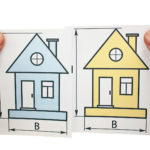By: Julie Ryan Evans
Homes are unlike the majority of other things people buy in that the price isn’t set in stone. Sure, the listing might include an “asking price,” but as this term suggests, that’s just a request rather than a hard, unwavering demand. And that’s why comps are so important. So what exactly are comps?
Short for housing “comparables,” comps are a way to help you figure out what a home is worth based on the recent sales prices of similar properties in the area. Home sellers (and their real estate agents) use comps to help them come up with their asking price, while buyers can use comps to come up with how much to offer. As such, it’s an important concept for both buyers and sellers to master.
Here are the basics on how to find comps and wield them to your advantage.
What are comps?
With housing comps, you ideally want to compare apples to apples—not apples to kiwi (which is, let’s face it, a strikingly unappealing fruit). In other words, it’s important for comps to be as similar to your own property as possible. While what constitutes a comp for a home will depend on each particular market, here are some ballpark parameters:
- Same location: According to John Lyons, a real estate broker with Baird & Warner in Chicago, a comp is usually considered a property located within a half-mile radius of the home in question.
- Same size: If the house in question is 5,000 square feet, you’ll ideally want to look at other houses hovering around 5,000 square feet.
- Number of bedrooms/bathrooms: When push comes to shove, this matters more than square footage. “While size is important, utility is a better gauge for comparability,” says Christine Lutz, director of residential brokerage for Kinzie Brokerage in Chicago. “You can have a three-bedroom, three-bath unit that’s 2,000 square feet, or you can have that same square footage in a one-bedroom/one-bath. Bedroom and bathroom counts need to be similar in order to be considered actually comparable.”
- Recent sales price: Since housing prices change from month to month, your comps should ideally be homes that were sold within the past six months to a year tops.
- Style, view, and other details: Units in the same high-rise may have different views—one of a lake, the other of a parking lot. So although they’re similar in terms of bedrooms and square footage, the lake view should be taken into account, too, and compared with other properties with lake views in the area. Meanwhile if you’re looking at attached dwellings such as townhouses or co-op apartments, end units typically fetch a higher price than interior units with homes on each side due to the added noise issues and/or fewer windows.
How to find comps and use them during negotiations
To find comps, you can start by looking for recent listings in your area on realtor.com®. But for a full, deep dive into the numbers, you’ll want to enlist the help of your real estate agent or other professional. The reason: Listings typically feature the asking price, but not the final sales price (which could be higher or lower and is a more accurate gauge of a home’s market value).
Luckily, your real estate agent will have access to databases with more detail like the multiple listing service. Realtors will also know how to synthesize all this information into an asking price (or offer) you can justify and stand by, which is important once the negotiations on a home get rolling.
For instance, let’s say you’re selling your home for $200,000 and some buyer lowballs you with $170,000. Comps will allow you (or rather your agent) to go back to the buyer and say, “Another three-bedroom with about the same square footage a block away just sold last month for $190,000! So, we’re fairly confident we can find a buyer who’ll pay at least that much. Care to raise your offer to $185,000 at least?”
Or else, let’s say you fall in love with a home with the asking price of $400,000. You’re tempted to pay what’s asked, but then you find out that the comps are going for only $350,000—which means you’d be overpaying by $50,000! This is an instance where you and your agent could inform the home seller, “Hey, we found comps in your area going for $350,000. So that’s why we’re offering you $360,000 and think it’s a fair offer.”
Keep in mind, though, that comps are more of an art than a science, which is why different professionals may come to different conclusions. Nonetheless, comps add oomph to back up whatever you’re asking for (or offering), strengthening your negotiation position and saving you tens of thousands of dollars. In other words, it pays, literally, to have comps in your corner.





